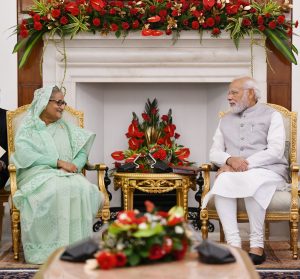Bangladesh Prime Minister Sheikh Hasina’s visit to India on September 5 to 8 saw the two sides signing seven Memorandums of Understanding (MoUs). These envisage cooperation in the areas of river water sharing, space, science and technology, broadcasting, and capacity building among railway and judicial personnel of the two countries.
Foremost among the pacts signed following talks between Hasina and her Indian counterpart Narendra Modi in New Delhi was the MoU to finalize an interim bilateral agreement on the withdrawal of water from the common border river, the Kushiyara.
Water sharing is an important item on the agenda of the India-Bangladesh relationship, given that the two countries share 54 transboundary rivers. The agreement reached on the Kushiyara is the first that the two neighbors have signed in 25 years.
Yet Hasina’s trip to Delhi was disappointing.
Bangladesh has been hoping for a treaty on the sharing of the waters of the River Teesta. The text of a pact relating to this, which gives India the right to 42.5 percent of this river’s water and Bangladesh the right to 37.5 percent, has existed for over a decade. An agreement was to be signed in September 2011 during the visit of the then Indian Prime Minister Manmohan Singh to Dhaka. However, India pulled out and a treaty remains elusive to date.
In Delhi, Hasina reminded her hosts to conclude a treaty on the Teesta “at an early date.”
India and Bangladesh have prioritized connectivity between the two countries. During Hasina’s visit, Modi pointed out that “expansion of connectivity and trade infrastructure at borders will help in the growth of both countries.”
Earlier in April, when India’s Foreign Minister S. Jaishankar was in Dhaka, Hasina had offered India access to its Chattogram port. “We need to improve our connectivity. India’s North-eastern provinces – Assam and Tripura – could have access to Chattogram port if the countries’ connectivity is improved,” she said.
The two prime ministers talked about connectivity during their talks in Delhi. But connectivity did not figure among the MoUs signed during Hasina’s visit.
There were several burning issues that Bangladesh would have wanted to be addressed at the Prime Minister-level discussions.
One is the killing of Bangladeshi nationals by Indian border guards. In July 2019. Bangladesh’s Home Minister informed parliament that 294 Bangladeshis had been killed by India’s Border Security Force in the last decade.
Another issue is that of the Rohingya refugees. Bangladesh is taking care of over a million refugees, which is a strain on its resources. Since India maintains good relations with the Myanmar government, the issue of Rohingya repatriation could have been discussed during the Modi-Hasina talks. Hasina should have sought India’s help in repatriating Rohingyas.
Bangladesh’s economy is showing a downward trend in the wake of the Russian invasion of Ukraine. Bangladesh should have sought India’s help in the import of Russian wheat and oil. Instead of addressing these important matters, the two sides discussed some minor issues.
A Bangladeshi journalist, who writes on diplomatic relations in South Asia, told The Diplomat that Hasina had undertaken the visit to Delhi with an eye on general elections to be held in 2023.
She would have hoped to hold up some achievements from the visit. That did not happen.
“Look at the kind of MoUs signed,” the journalist said. What was signed in New Delhi, he pointed out, “could have been signed by other officials, not by a Prime Minister.”
In a piece I wrote in June 2022 on India-Bangladesh relations I argued that Bangladesh did not protest derogatory comments made about Islam and the Prophet by Bharatiya Janata Party (BJP) leaders as Hasina does not want to rile India.
With the U.S., U.K. and Japan repeatedly stressing the need for a free and fair election, she needs India’s support. It is worth mentioning here that the last two elections in Bangladesh in 2014 and 2018 were rigged and unfair. International human rights organizations had drawn attention to the flawed elections.
Keeping India happy is not an easy task for Bangladesh, especially at a time when the latter is under pressure from China, which is closely monitoring Bangladesh’s moves with regard to its relations with India and the U.S. China has already warned Bangladesh that if it joins the Quad, Sino-Bangladesh relations will be impacted.
China is a strategic partner of Bangladesh. It is Dhaka’s biggest trade partner. At a time when Bangladesh’s economy is shrinking, which is reflected in its depleting forex reserves, Dhaka needs Chinese support.
So far, Bangladesh has managed to maintain a balance with its foreign partners. It has been able to maintain friendly relations with all countries, a key objective of its foreign policy.
How long Hasina’s government will be able to maintain good relations with all remains to be seen.

































